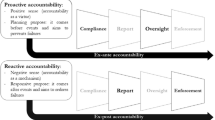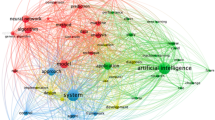Abstract
According to the conventional wisdom, Turing (1950) said that computing machines can be intelligent. I don't believe it. I think that what Turing really said was that computing machines –- computers limited to computing –- can only fake intelligence. If we want computers to become genuinelyintelligent, we will have to give them enough “initiative” (Turing, 1948, p. 21) to do more than compute. In this paper, I want to try to develop this idea. I want to explain how giving computers more ``initiative'' can allow them to do more than compute. And I want to say why I believe (and believe that Turing believed) that they will have to go beyond computation before they can become genuinely intelligent.
Similar content being viewed by others
References
Bruner, J.S. (1973), Beyond the Information Given: Studies in the Psychology of Knowing, NewYork: W. W. Norton & Company.
Carpenter, B.E. and Doran, R.N., eds. (1986), A.M.Turing's ACE Report and Other Papers, Cambridge, MA: MIT Press.
Chomsky, N. (1956), ‘Three Models for the Description of Language’, IRE Transactions on Information Theory IT2, pp. 113–124.
Chomsky, N. (1957), ‘Review of Skinner’, Language 35, pp. 26–58.
Chomsky, N. (1965), Aspects of the Theory of Syntax, Cambridge, MA: MIT Press.
Copeland, B.J., ed. (1999), ‘A Lecture and Two Radio Broadcasts on Machine Intelligence by Alan Turing’, Machine Intelligence 15, pp. 445–476.
Copeland, B.J. (2000), ‘The Turing Test’, Minds and Machines 10, pp. 519–539.
Gödel, K. (1931), ‘Ñber Formal Unentscheidbare Sätze Der Principia Mathematica Und Verwandter System I’, Montaschefte für Mathematik und Physik 38, pp. 173–198.
Gold, E.M. (1965), ‘Limiting Recursion’, Journal of Symbolic Logic 30, pp. 28–48.
Goodman, N. (1954), Fact, Fiction, and Forecast, Cambridge, MA: Harvard University Press.
Jain, S., Osherson, D., Royer, J.S., Sharma, A. (1999), Systems That Learn: An Introduction to Learning Theory, second edition, Cambridge, MA: MIT Press.
Kugel, P. (1977), ‘Induction Pure and Simple’, Information and Control 35, pp. 276–336.
Kugel, P. (1986), ‘Thinking May Be More Than Computing’, Cognition 22, pp. 137–198.
Lovelace, A.A. Countess of (1843), ‘Sketch of the Analytical Engine Invented by Charles Babbage, Esq., by L.F. Menabrea, of Turin, Officer of the Military Engineers, translation with extensive notes’ in Taylor's Scientific Memoirs III, ed. R. Taylor, London: R. & J.E. Taylor.
Lucas, J.R. (1961), ‘Minds, Machines and Gödel]’, Philosophy 36, pp. 112–127.
Martin, E. and Osherson, D. (1998), Elements of Scientific Inquiry, Cambridge, MA: MIT Press.
Melzer, B. and Michie D., eds. (1969), Machine Intelligence 5, New York: American Elsevier.
Putnam, H. (1965), ‘Trial and Error Predicates and the Solution of a Problem of Mostowski’, Journal of Symbolic Logic 20, pp. 49–57.
Rosser, J.B. (1936), ‘Some Extensions of Some Theorems of Gödel and Church’, Journal of Symbolic Logic 1, pp. 87–91.
Searle, J. (1980), ‘Minds, Brains, and Programs’, Behavioral and Brain Sciences 3, pp. 417–424.
Storck, D.G. (1997), Hal's Legacy: 2001's Computer as Dream and Reality, Cambridge, MA: MIT Press.
Turing, A.M. (1936), ‘On Computable Numbers,With an Application to the Entscheidungsproblem’, Proceedings of the London Mathematical Society, Series 2, 42, pp. 232–265.
Turing, A.M. (1939), ‘Systems of Logic Based on Ordinals’, Proceedings of the London Mathematical Society, Series 2, 45, pp. 161–228.
Turing, A.M. (1946/1986), ‘Proposal for Development in the Mathematics Division of an Automatic Computing Engine (ACE)’, in B.E. Carpenter and R.N. Doran, eds., A.M.Turing's ACE Report and Other Papers, Cambridge, MA: MIT Press.
Turing, A.M. (1947/1986), ‘Lecture to the London Mathematical Society on 20 February 1947’, in B.E. Carpenter and R.N. Doran, eds., A.M.Turing's ACE Report and Other Papers, Cambridge, MA: MIT Press.
Turing, A.M. (1948/1969), ‘Machine Intelligence’, in B. Meltzer and D. Mitchie, eds., Machine Intelligence 5, New York: American Elsevier.
Turing, A.M. (1950), ‘Computing Machinery and Intelligence’, Mind 59 (N.S. 236), pp. 433–460.
Turing, A.M. (1952), ‘Can Automatic Calculating Machines Be Said to Think?’, in Copeland (1999).
Wang, H. (1974), From Mathematics to Philosophy, London: Routledge & Kegan Paul.
Wittgenstein, L. (1958), Philosophical Investigations, New York: McMillan.
Wittgenstein, L. (1976), Wittgenstein's Lectures on the Foundations of Mathematics Cambridge, 1939, ed. C. Diamond, Hassocks, Sussex: The Harvester Press.
Author information
Authors and Affiliations
Rights and permissions
About this article
Cite this article
Kugel, P. Computing Machines Can't Be Intelligent (...and Turing Said So). Minds and Machines 12, 563–579 (2002). https://doi.org/10.1023/A:1021150928258
Issue Date:
DOI: https://doi.org/10.1023/A:1021150928258




